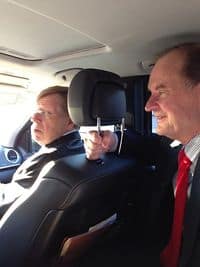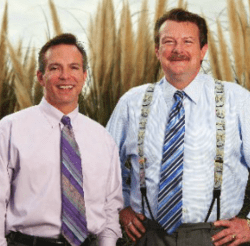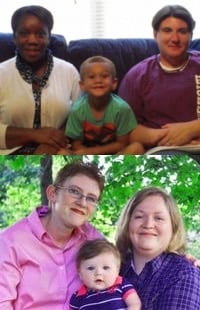There are two federal marriage equality cases going on in Virginia. They look a lot alike: Both revolve around same-sex Virginia couples who want to marry; both challenge Virginia's explicit constitutional ban on such unions; both address the lack of recognition of valid out-of-state marriages of same-sex couples; both want to reach the Supreme Court and hope to decide, once and for all, that bans on marriage freedom are unconstitutional.
The cases differ in two critical aspects: Different courts and different lawyers.
 In one case, the American Foundation of Equal Rights (AFER) and Ted Olson and David Boies have taken the lead even though it was originally filed by a local law firm. In the other case, Lambda Legal and the American Civil Liberties Union (ACLU) have picked up the baton of marriage equality.
In one case, the American Foundation of Equal Rights (AFER) and Ted Olson and David Boies have taken the lead even though it was originally filed by a local law firm. In the other case, Lambda Legal and the American Civil Liberties Union (ACLU) have picked up the baton of marriage equality.
Some say it's a race. Who can craft the best case. Who can win first. Who can get to the Supreme Court first. There has been some chatter among the LGBT press in this vein.
I do not dive so quickly toward paranoia. No one can deny that there's a certain competitive storm swirling around these neighboring lawsuits. After all, AFER got to the Supreme Court first, in Perry v. Brown, but the ACLU actually won an important victory in Windsor, the DOMA case. Meanwhile, Lambda was filing and winning marriage equality cases throughout the country and, of course, won us the right to be who we are ten years ago in Lawrence v. Texas.
But there is nothing inherently wrong with a multipronged attack on marriage discrimination. In fact, we should see this as a good sign! We are, ultimately, giving the federal courts multiple ways to eradicate an odious law. Let's just make sure these multiple ways forward do not devolve into multiple battles backward.
CONTINUED, AFTER THE JUMP…
 First, here is some background on how these cases came about. Virginia is divided into two federal court districts. In the eastern part of the state, a local law firm brought a case on behalf of Timothy Bostic and Tony London. The two long-time partners would like to marry, so they and their lawyers argue that Virginia's ban on same-sex marriage violates the Equal Protection Clause and the Due Process Clause of the Fourteenth Amendment.
First, here is some background on how these cases came about. Virginia is divided into two federal court districts. In the eastern part of the state, a local law firm brought a case on behalf of Timothy Bostic and Tony London. The two long-time partners would like to marry, so they and their lawyers argue that Virginia's ban on same-sex marriage violates the Equal Protection Clause and the Due Process Clause of the Fourteenth Amendment.
Recall that we've heard those precise arguments before: In the case that ended up at the Supreme Court several months ago, Perry v. Brown. Perry was the cause celebre of the AFER and its legal team of Ted Olson and David Boies. So, it should come as no surprise that AFER, Olson, and Boies joined the Bostic case, taking the lead in the litigation.
 Shortly after the original Bostic case was filed, but before AFER decided to join in the game, Lambda Legal, the country's oldest and most successful LGBT legal advocacy organization, joined with the ACLU to bring a marriage equality case in the western part of the state. That case focuses on two couples – Joanne Harris and Jessica Duff and Christy Berghoff and Victoria Kidd — whom, together, brought a comprehensive case seeking marriage rights in Virginia and the recognition of valid out-of-state marriages in Virginia, as well.
Shortly after the original Bostic case was filed, but before AFER decided to join in the game, Lambda Legal, the country's oldest and most successful LGBT legal advocacy organization, joined with the ACLU to bring a marriage equality case in the western part of the state. That case focuses on two couples – Joanne Harris and Jessica Duff and Christy Berghoff and Victoria Kidd — whom, together, brought a comprehensive case seeking marriage rights in Virginia and the recognition of valid out-of-state marriages in Virginia, as well.
They also want their case certified as a class action. That refers to a case where one or a few plaintiffs want to represent thousands. You can't have thousands of people show up and sit at the plaintiffs table; nor does the system want thousands of separate, yet identical cases arguing the same things. But that is exactly the scenario here: all gay couples in Virginia have precisely the same problem and precisely the same arguments against that state's marriage discrimination provision. So, a class action would bring their interests into one case and automatically apply the decision to every one of those gay Virginia couples.
That's important because normally, a trial court decision only applies to the particular plaintiffs and defendants. But, as a class action, the decision applies to all members of the class regardless of their plaintiff status.
Lambda and the ACLU are doing this to avoid any problems with the ultimate decision and to prevent any future judge or conservative interest group who might want to limit the effect of a pro-equality decision to the particular plaintiffs in the case.
And yet, as we know, there are still two cases.
It is easy to see this as a competition between lawyers for credit. Undoubtedly, being the lawyer or the organization that ends up being responsible for bringing about marriage equality nationwide is going to be a big deal. It will lead to fame, accolades, and money.
But more prongs of attack could lead to a more swift victory. Two cases in neighboring jurisdictions has the feel of overwhelming force. And overwhelming force is exactly what we need to create a 5+ majority on the Supreme Court. I am consistently reminded of now-retired Justice Sandra Day O'Connor's truism — "Rare indeed is the legal victory that is not a careful byproduct of an emerging social consensus" — and what better way to show that a consensus has emerged than case after case after case, from all over the country, finding that state bans on same-sex marriage are unconstitutional. To that end, we should want Lambda, the ACLU, and AFER to be filing so-called "competing" law suits elsewhere, not just in Virginia.
Our community has great potential if our leaders work together. We also have the potential to bury ourselves under fear, discontent, and paranoia. Our lawyers are, in fact, working together to achieve the same goal. Our media should not be so quick to condemn them as selfish competitors.
***
Follow me on Twitter: @ariezrawaldman
Ari Ezra Waldman is the Associate Director of the Institute for Information Law and Policy and a professor at New York Law School and is concurrently getting his PhD at Columbia University in New York City. He is a 2002 graduate of Harvard College and a 2005 graduate of Harvard Law School. Ari writes weekly posts on law and various LGBT issues.




